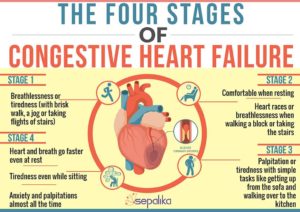Heart failure, sometimes known as congestive heart failure or CHF, is a chronic condition in which the heart doesn’t pump blood as well as it should. It can occur if the heart cannot pump blood or fill the chambers adequately. Certain conditions such as coronary artery disease or hypertension, will gradually leave your heart too weak or stiff to fill and pump as it should.
Not all cardiac conditions that lead to heart failure can be reversed. However, some treatments can improve the signs and symptoms of heart failure, which will help you live longer. Some lifestyle changes like regular exercise, reducing sodium in your diet, managing stress, and maintaining a healthy weight can improve heart health and quality of life. One way to prevent heart failure is to prevent and control conditions that directly lead to heart failure. These conditions include but are not limited to coronary artery disease, hypertension, diabetes, or obesity.
Symptoms of Heart Failure
You should see your doctor or call 9-1-1 if you think you are experiencing a heart attack. Please see your doctor to be checked for heart failure if you experience any of the following symptoms.
- Shortness of breath, aka dyspnea, when exercising or lying down
- Fatigue
- Weakness
- Swelling (aka edema) in your legs, ankle, and feet
- Rapid/irregular heartbeat
- Reduced ability to exercise
- Persistent cough or wheeze with white or pink colored phlegm
- Increase in urination at night
- Abdominal swelling (ascites)
- Rapid weight gain due to fluid retention
- Lack of appetite
- Nausea
- Difficulty concentrating/decreased alertness
- Sudden, severe shortness of breath and coughing up pink, foamy mucus
- Chest pain, if your heart failure is caused by a heart attack

Stages of Heart Failure
There are four stages of heart failure 1, 2, 3, or 4. As heart failure progresses through the stages, a person’s survival rate for 5+ years decreases.
Stage 1
Those in stage 1 do not yet have issues with the pumping function of their heart. However, they do have a high risk of developing heart failure due to presence of related conditions like those listed above. People in stage 1 don’t have issues with the structure of their heart or how their heart works. It is rare to experience symptoms in this stage of heart failure. But a person may have symptoms related to other cardiac conditions.
Stage 2
Those in stage 2 of heart failure begin to have a reduced pumping function from the heart. This can lead to an enlarged left ventricle. The left ventricle pumps the blood rich in oxygen through the aortic valve and into the rest of the body. This area builds up while trying to overcompensate for the reduction in pumping function. An enlarged left ventricle can also result from previous heart attack(s). Some people in stage 2 remain asymptomatic.
Stage 3
In stage 3, people will begin to show some of the symptoms above. Most are currently undergoing treatment either before or during stage 3. The symptoms usually appear in this stage due to problems with the pumping chamber of the heart (or left ventricle). The patient may benefit from a referral to palliative care for enhanced symptom management.
Stage 4
People in stage 4 have advanced heart failure and exhibit symptoms even when at rest. This stage is severe and may require advanced, specialized treatment or hospice care, depending on the patient’s treatment plan.
Check out our previous post on how palliative care can benefit patients with heart failure here.
If you or a loved one is in need of St. Anthony’s Palliative or Hospice Care, please call us at (270) 826-2326 or make an online referral.
